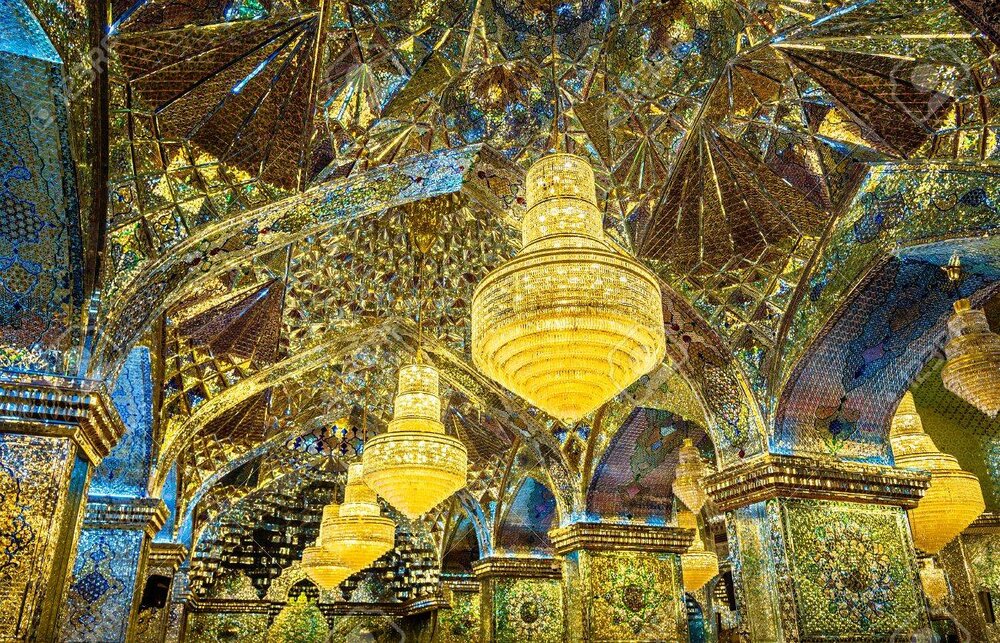Majestic Shah Cheragh where mirrors and glass shards cover every inch

TEHRAN – The dazzling shrine of Shah Cheragh is a major tourist destination and pilgrimage site in the ancient city of Shiraz, southern Iran.
The mausoleum is where Sayyed Mir Ahmad, one of the brothers of Imam Reza (AS), is laid to rest. Each day, it draws hundreds of faithful and sightseers from all over the world.
It boasts architectural elements and motifs from various centuries and its courtyard and tilework represent relatively modern embellishments from the late-Qajar period. Its blue-tiled dome is flanked by dazzling gold-tipped minarets.
Inside its great chamber of worship, giant chandeliers hang like frozen rain, smaller green lamps jut from the walls and stained-glass windows shine from on high, emitting light that sparkles off countless jewels and shards of glass.
They coat almost the entire interior of this special place, giving its dome a shimmering glow and making its elegant doorways feel like portals.
The site was improved and expanded over the centuries with religious schools and other facilities being added to the complex. In the 14th century, the site’s signature mirrorball decoration was ordered at the behest of Queen Tash Khatun who wanted the mosque to intensify any light thousand times over, the name “Shah Cheragh” roughly translating to “King of the Light” in Persian.
Inside its great chamber of worship, giant chandeliers hang like frozen rain. Despite being damaged by human hands and natural disasters over the centuries, the mosque has been maintained and repaired and shines brightly even today. The increasingly sprawling site is still an extremely important pilgrimage location for Shia Muslims, however, visitors of any faith are likely to marvel at the sheer beauty of this glassy wonder.
The mausoleum has undergone various restoration projects over time. It was registered on the National Heritage list in 1939.
There is also a modest museum in the northwestern corner of the courtyard, next to the shrine, which showcases shrine-related objects, including some ancient copies of the Holy Quran.
Non-Muslim guests will be matched up with an English-speaking guide on arrival. Women must wear a chador (open cloaks that leave the face exposed) within the whole shrine complex, available for free at the women’s entrance.
Elsewhere, this former Iranian capital has gorgeous gardens and ornate palaces and pavilions. Masjed-e Nasir Al Molk (also known as the Pink Mosque) has rosy tiles and lovely stained glass that give it a dreamlike quality, especially if you visit when the sun streams through in the morning.
There are also museums and teahouses, while the famous ruins of Persepolis are only 60km away. Darius the Great’s ambitious city was burnt by fire and buried by sand, but its monuments and friezes are still astounding: they speak of ambition and power, but also the careful craftsmanship of days long past.
Here is a selection of comments that visitors to Shah Cheragh have posted to TripAdvisor, one of the most popular travel websites in the world:
‘A different holy place’
This holy place gave me positive energy and I did yoga there that was great. Unfortunately, I couldn't see the main part of the holy shrine because it's allowed just for Muslims but outside was enough for me to know how pretty it is. Highly recommend. (judi l.)
‘Love the glittery decor’
This is a must-visit in Shiraz. There is a free guided tour and ladies will be given an overall to wear over their clothes. The interior is beautiful with all the glittering furnishings. Unfortunately, not all areas are opened to ladies. (The Weak Knee Traveler from Singapore)
‘A must-see in the night’
My first visit was in the morning but the tour guide that assisted me for a show around said that the best time to visit is after sunset to witness the lighting which is absolutely true! beautiful lighting and the Iranian are so kind. (VSGrande from Muscat, Oman)
‘An immersion into an amazing blend of ancient and contemporary Persian culture’
The shrine itself is a lovely example of contemporary Iranian religious architecture, but a visit is much more about getting an understanding of Iranian people and their way of life. There are two options for a visit: one is to visit the shrine with a guide (mandatory if you want to visit the interior), or politely decline and wander about the courtyard unhindered. In the latter case, there will be an opportunity to interact with Iranians from diverse backgrounds, and experience matching or surpassing the lovely architecture of the shrine. (Andrasz from London, United Kingdom)
‘Jaw-dropping mirror mosaics’
Decided to drop by this place on my last day in Shiraz. I was completely floored when I entered the first shrine. The entire ceiling and walls are completely covered in multi-colored mirror mosaics or different shapes and sizes giving the impression that the entire place is covered with shimmering diamonds…. “Bryan G. from Perth, Australia)
‘Pray place’
So nice place and many people are there for pray and I like here so much, in the night time very nice place. (Liam P. from Rome, Italy)
‘Most beautiful mosque’
The interior of the mosque is amazing, covered in different color mirrors…a local guide takes you around for free. Not an in-depth tour but they are there to answer any questions you may have. (FinnianOD from London, United Kingdom)
‘Must see’
This place is very famous among tourists and if you are lucky and get a guide, then the visit will be a great free entrance. (Piotr M. from Warsaw, Poland)
‘Just amazing!’
The wonderful shrine and the attendant were so kind and helpful…Amazing mirrored spaces, but the colors are derived from the illuminating lights, not the myriad mirrors. If you are in Shiraz, this is not to be missed. (R-R2025 from Macclesfield, the UK)
AFM
